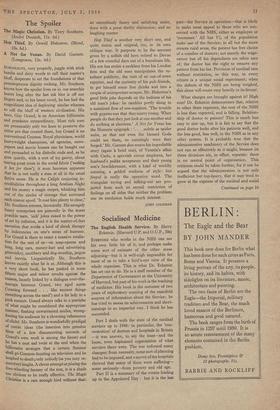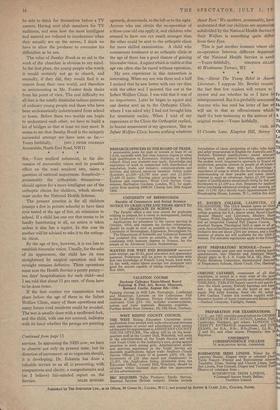Socialised Medicine
EVERYONE who works in the NHS can see his own little bit of it, and perhaps make some sort of estimate of the other areas adjoining—but it is well-nigh impossible for most of us to take a bird's-eye view of the whole organism. This is what Dr. Eckstein has set out to do. He is a staff member of the Department of Government at the University of Harvard, but part of his work is the teaching of medicine. His book is the outcome of two years of exploratory conning of the manifold sources of information about the Service; he has tried to assess its achievements and short- comings in an impartial way. I think he has succeeded.
Part I deals with the state of the medical services up to 1948: in particular, the 'con- centration' of doctors and hospitals in Britain —it was uneven, to say the least—and the loose, even haphazard organisation of what services there were. The war enforced many changes; from necessity, some sort of planning had to be imposed, and a survey of the hospitals showed that many of them were suffering— some seriously—from poverty and old age.
Part II is a summary of the events leading up to the Appointed Day : but it is the last
part—the Service in operation—that is likely to make most appeal to those who are con- cerned with the NHS, either as employee or 'consumer.' All but 5% of the population make use of the Service; in all but the more remote rural areas, the patient has free choice of a number of doctors; not merely the wage- earner but all his dependants are taken care of; the doctor has the right to remove any patient from his list. Provision of medical care without restriction, in this way, to every citizen is a unique social experiment; when the defects of the. NHS are being weighed, this alone will count very heavily in its favour.
What charges are brought against it? High cost? Dr. Eckstein demonstrates that, relative to other State expenses, the cost of the NHS is less than expected, and is falling. Relation- ship of doctor to patient? This is much less easy to size up, but it is fair to say that the good doctor looks after his patients well, and the less good, less well, in the NHS as in any other system. It is probably true that the administrative machinery of the Service does not run as effectively as it might, because its three divisions are, in effect, separate: there is no central point of organisation. This criticism could be taken further, for it can be argued that the administration is not only inefficient but top-heavy, that it may tend to grow at the expense of the medical and social
Continued on page 16
Continued from page 13 services. In appraising the NHS now, we have to observe not only its present state, but its direction of movement: as an organism should, it is developing. Dr. Eckstein has done a valuable service to us all in presenting, with compactness and clarity, a comprehensive and (as I believe) fair-minded report on the































 Previous page
Previous page